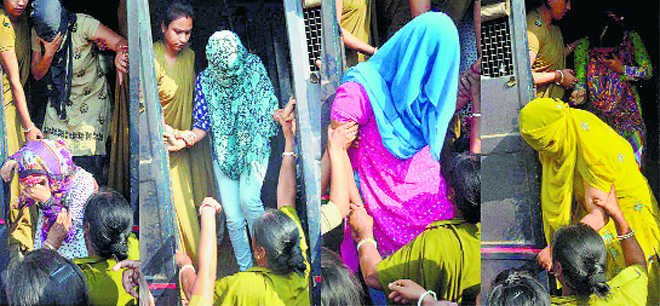
To what end? It’s a fact: many who are ‘rescued and rehabilitated’ return to sex work.
Flavia Agnes
IN a recent newspaper article titled, ‘Why I pushed for passage of the anti-trafficking Bill’, Union Minister for Women and Child Development Maneka Gandhi offered a justification for the haste with which the Trafficking of Persons (Prevention, Protection and Rehabilitation) Bill, 2018, was pushed through in the Lok Sabha on July 26, 2018: ‘Because our children and women cannot wait any longer. A child in sexual exploitation and a woman in sexual slavery are looking up to us and questioning us on what we are doing as a civilised society and a welfare State’. She added, ‘It was a matter of great urgency since every day thousands of children and women are trafficked and the society had a collective responsibility to respond to their desperate plea’.
The Bill is meant to go much further in its scope and reach than the prevailing Immoral Traffic Prevention Act (ITPA) and will address the issue of trafficking from the point of view of prevention, rescue and rehabilitation. It has defined ‘aggravated’ forms of trafficking, which includes trafficking for the purpose of forced labour, begging, trafficking by administering chemical substance or hormones on a person for the purpose of early sexual maturity, trafficking of a woman or child for the purpose of marriage or under the pretext of marriage, etc.
She offered an olive branch to all groups working with sex workers collectives who had expressed serious concerns that the Bill, if enacted, would violate the basic rights of women who are in the sex work industry of their own volition, and invited them to work together with the government ‘so that differences could be ironed out and together we can learn and work in collaboration to push the boundaries of justice and empower the most vulnerable persons in our society’.
The minister assured that the provisions of the Bill had been carefully synchronised with all existing and linked provisions of law and structures created thereunder. It aims to supplement existing criminal law provisions on trafficking under Section 370 of the IPC and the Immoral Traffic (Prevention) Act 1956. The definition of trafficking is drawn primarily from Section 370, IPC, which includes ‘any act of physical exploitation, sexual exploitation, slavery or practices similar to slavery and servitude’. Trafficking under this Bill also includes begging, domestic work, farm or factory work.
But activists have pointed various gaps which fail to address the core concerns of trafficking and the lapses which threaten free speech and the right to work under Article 19 and the basic human dignity guaranteed under Article 21 of the Constitution. Meena Seshu of the National Network of Sex Workers, a strong and articulate voice in the movement to protect the dignity of sex workers and their right not just to work, but to survive, has been opposing this enactment in its current form for the past few years. According to her, the state administration has turned a deaf ear to their anguished pleas.
She explains that framing trafficking as an issue of morality wrongly assumes that no woman would enter sex work of her own volition. The experiences of sex workers picked up during raid and rescue operations have brought out the stark reality that the approach of ‘raid, rescue and rehabilitation’ rarely addresses the issue of trafficking, and instead results in large-scale rights violations of sex workers with the underlying presumption that only trafficked women need to be rescued and rehabilitated.
The world over, anti-trafficking laws and policies have placed sex workers on the cusp of violence inflicted by law enforcers and anti-trafficking groups. The experiences of sex workers picked up during these operations reveal that this strategy rarely addresses the issue of trafficking. Anecdotal information gathered by sex worker rights activists in India as well as studies conducted have brought out the harsh reality that many women who are ‘rescued and rehabilitated’ return to sex work. The ITPA, with ‘immoral’ and ‘traffic’ in its very title, suggests that trafficking is an issue of morality rather than a criminal offence. Its interpretation on the ground, therefore, adopts an anti-sex worker approach.
On the presumption of lack of consent, Section 17(2) of the ITPA states that a woman who is rescued as a consequence of raid and rescue operations can be handed over into the ‘safe’ custody of her husband or parents or guardian and this includes adult women who have consented to sex work. A magistrate satisfied about the antecedents and suitability of the husband, parents or guardians, may issue an order granting custody to them.
This section, which infantilises adult women, is debilitating for women who are in sex work as adults living independent of parents or family. Many are heads of their households and primary providers for their families. In many cases, adult women do not inform their families that they are in sex work. When directed by the magistrate to produce a husband, parents and guardians in court, they are forced to contact family members in humiliating circumstances.
Instead of addressing the core issue of prevention of trafficking, the approach of raid, rescue and rehabilitate increases vulnerabilities of sex workers as they get further trapped into debt bondage and other exploitative practices. Fees to lawyers, surety for bail, bribes to officials and mounting daily expenses in the absence of income due to incarceration, force women released from correction homes to incur huge debts. Ironically, getting trapped in a cycle of debt bondage is a consequence of a raid and rescue strategy which is purportedly designed to help these women.
While this is the current situation, the Bill, when enacted, will make the situation far worse in the name of protection and prevention. It will lead to greater surveillance and adult victims will be sent to rehabilitation homes or repatriated to their places of origin. Aarthi Pai, another activist involved with Sangram, a sex worker collective, points out: ‘There is no provision provided if ‘victims’ do not want to go to rehabilitation or accept repatriation which is against Article 19(1)(g) of the Constitution which guarantees the fundamental right to work.’
The key notions underlying Article 21 are dignity and autonomy. While admitting that trafficking is clearly a criminal offence that requires strict measures to combat unscrupulous persons and criminal networks, activists point out how all measures to deal with trafficking in the Bill focus on the victims rather than the perpetrators of the crime.
Mumbai-based women’s rights lawyer



























